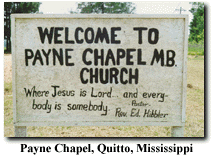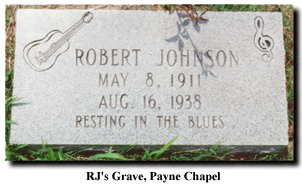|
"If you want to learn how to make songs yourself, you take your guitar and your go to where the road crosses that way, where a crossroads is. Get there be sure to get there just a little ' fore 12 that night so you know you'll be there. You have your guitar and be playing a piece there by yourself…A big black man will walk up there and take your guitar and he'll tune it. And then he'll play a piece and hand it back to you. That's the way I learned to play anything I want." Tommy Johnson
One of the questions which is always on our minds here at the Mudcat is: Is it possible to sell one's soul to the devil? Shawn{one of the people who works with the Mudcat} traveled to the crossroads with his guitar at midnight. He played his entire repertoire twice, but to no avail. No devil, no big black man, just the same tuning which he began the night. Though, he did try this in the North, and since we are optimists, and maintain hope that maybe one needs to be at a southern crossroads. I asked Clarence Gatemouth Brown if he knew anyone who sold his soul to the devil. Unfortunately he did not. And I had the feeling he thought it a foolish question. I took my search to the library and decided to focus on Robert Johnson. The majority of the information concerning Robert Johnson said relatively the same thing -- nothing. It is only the rumor, or legend, surrounding him. People tell about a young RJ being scolded and ridiculed by Son House at a local juke joint. All that is known is that Robert Johnson disappeared for a time span and when he returned his genius flourished with his guitar. One author chalked it up to intensive practice over a year's time.
A man named Julio Finn wrote a book titled: The Bluesman The Musical Heritage of Black Men and Women in the Americas. Finn adds the factor of voodoo to the equation, "It is doubtful whether Johnson could have written the lyrics of songs with out having been initiated into the cult…the symbolism involved in them is highly complex and of a nature which makes it highly improbable that they were simply things he 'picked up'(215)." With voodoo given credence, Finn provides an intuitive insight of Johnson's psyche and artistic sensibility. I believe an answer to our burning question is found with Julio Finn.
Just a hint of background information The crossroads is a place loaded with superstitions and stories. Back in the days before the automobile and paved highways, people traveled dirt roads through the wilderness and bayous either on horseback or by foot. The pace of the journey was generally slow and often caused the mind to wander in the trees and shrubs. In a way travelers were much more vulnerable. They did not have the safety of their cars or road side phones to call for help. And as darkness fell, I'm sure that all of the superstitions and stories of evil devoured their consciousness. Many countries such as the European countries, India, Greece and Japan, as well as people such as the American Indians, subscribed to the superstitions and folk tales of the crossroads. At these intersections, demons, evil spirits, ghosts, Kobolds and fairies were found. It is a burial place for suicides and murderers and a dump heap for parricides. The crossroads is a rendezvous for witches who use this place for Sabbat rituals. Sacrifices were offered to the gods to protect humans from the evil which lurked here. Legba is a trickster deity and god of entrances and crossroads. He is part of the belief systems of blacks of Dutch Guina, Brazil, Trinidad, Cuba and the voodoo cult of Haiti and New Orleans. In the new world, Legba goes about in tatters and he functions in cult rituals "to open the way" for the gods to possess their devotees. For this reason his songs are sung first at all rites. In the new world syncretism he is often equated with the devil. With this information, we can assume that when Robert Johnson made his claim of meeting the devil, he was referring to Legba.
Let's Return to Robert Johnson Robert Johnson's first instrument was the harmonica. In his teens he began to play the guitar. Robert Johnson saw the blues as a vehicle to help him escape his position in America. As a black youth of the South, he had little hope for even a chance at a simple middle class existence. Basically, a field hand was the only position open to him. The young RJ was not disposed to this form of labor. His step father was often annoyed at him for his lack of work in the fields. He spent very little time there. Music empowered him to rise above, or possibly, to avoid the burdens of the plantations. Music offered opportunity, excitement and travel: "{The Blues} spoke of notorious good-time women and big-shot gamblers; they told about wangas and charms which gave a person supernatural powers…To be a bluesman would give him the right to partake of that wandering, devil-may-care existence(212,Finn)". His early influences were Son House and his accompanist Willie Brown. RJ would sneak off to one of the local juke joints at night and sit at the feet of these two gifted men. His eyes back and forth from one guitar to the other lost in the concentration of learning. Son House recalls in the Living Blues how when they went outside for a break, RJ would pick up one of the guitars and begin to play: "And such a racket you never heard! It'd make the people mad, you know. They'd come out and say, 'Why don't y'all go in and get that guitar away from that boy! He's running people crazy with it!' I'd come back in, and I'd scold him about it, ' Don't do that Robert. You drive the people nuts. You can't play nothing. Why don't you play that harmonica for'em.' But he didn't want to blow that. Still, he didn't care how I'd get after him about it. He'd do it anyway."
Finn's argument for voodoo becomes stronger at this point in Johnson's life. Johnson's young wife died during childbirth. Finn sees this as a catalyst which draws Johnson to a search within himself, an attempt to gain control of his life: "Confronted with yet another crisis, this young man sought a means of transforming his life, by transforming life itself into a work of art. Disillusioned with the reality the white world imposed upon him, he turned to the world of magic to the supernatural powers promised by Hoodoo…Having realized that music was a kind of magic, he sought out magic to gain control over it(213)." To harness this power he sought the guidance of a Root Doctor{a voodoo medicine man}. Deep in the bayou, he sought to understand that energy which all human beings possess. He learned to channel it through his guitar, much the same way a practitioner of voodoo channels a spirit using his body. In this way the blues is an offshoot of voodoo, an Americanized version of the African religion. Finn argues that RJ was possessed by the idea of death: "His songs are laments of a soul too sensitive to face up to the brutal realities of its existence. For Johnson was a creative genius in every sense of the word, by which I mean that he came to embody the art he practiced. He 'created' his-for lack of a better term- 'neurosis' the same as he created his songs; his genius gave birth to those very hellhounds he thought were following him when, in fact, the were inside him. That he made a pact at the crossroads, I do not doubt for a moment; but it was he who supplied the demon of the lore, the 'big black man'….His was the Nat Turner style of creativity, which either begets great artists or social revolutionaries. Turner saw blood in the sky, Johnson 'blues falling like hail'. He needed the curse of the crossroads in order to justify the existence of such visions…the devil became his excuse for being a genius(218)."
Finn's book, The Bluesman the Musical Heritage of Black Men and Women in the Americas, primary concerns itself with the background from which black music had evolved. It is for this reason that such an insightful look into one of the blues' biggest mysteries is found. Voodoo, the religion brought to the Americas on the slave ships, was replaced by a people seeking a chance to join the white Christian society. Because black culture has only recently been given even the slightest opportunity for acceptance, it is understandable how such an explanation can be hidden from our mainstream sensibilities. One can only wonder what other answers to life's mysteries are waiting in exile. | 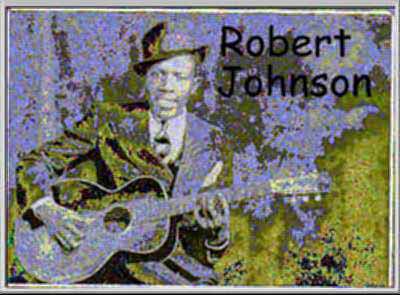
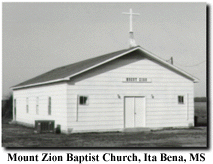 From here, Son House took Robert Johnson under his wing, and soon took Robert out of his seemingly abusive home, and his work in the fields. From here, Robert continued his journeys playing through the Delta.
From here, Son House took Robert Johnson under his wing, and soon took Robert out of his seemingly abusive home, and his work in the fields. From here, Robert continued his journeys playing through the Delta.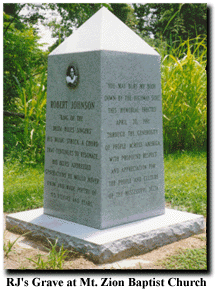 1936 in a hotel room in San Antonio, and 1937 in a back room in Dallas, by John Hammond. John Hammond returned to the Delta in 1938 looking for Robert for the "Spirituals to Swing" concert in December of 1938, and he found that he had died.
1936 in a hotel room in San Antonio, and 1937 in a back room in Dallas, by John Hammond. John Hammond returned to the Delta in 1938 looking for Robert for the "Spirituals to Swing" concert in December of 1938, and he found that he had died. 